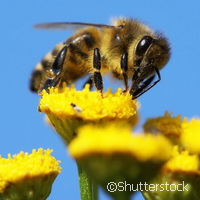Severe pollination decline to impact consumer: study
Pollination by insects, such as bees and hover flies, is what helps 66 % of the world's crops used for human production grow. It also supports most wild plant species. But as pressures continue, an international team of researchers feels the future does not bode well for this ecosystem. A case in point is how farmers in Sichuan, China are now pollinating apple flowers with pollination sticks, which are made of chicken feathers and cigarette filters. This comes after 3,000 years of sustainable agriculture in the area. But China is not alone; regions around the world, including Europe, are increasingly seeing the threat to the ecosystem. The study was funded in part by the STEP ('Status and trends of European pollinators') project, which has received almost EUR 3.5 million under the Environment Theme of the EU's Seventh Framework Programme (FP7). Researchers observed that the number of pollinators and provision of pollination services in extensive temperate and tropical agroecosystems, which undergo thorough management processes, are in severe decline. This development concerns Europeans significantly because of the EUR 153 billion global crop production, EUR 22 billion is generated in Europe, and all of this depends on insect pollination. The end result, they fear, is a direct impact on the stability of food production and consumer prices. Ultimately, the health of Europeans could be affected as well. The researchers pointed out that fewer fruits and vegetables available to consumers could trigger health problems in many areas around the world. The World Health Organization (WHO) recommends that people should eat a minimum of 400 grams per capita per day of fruits and vegetables. Studies have shown that over 50 % of European households fall below this recommendation. If the problem with the pollinators is not resolved, this number will undoubtedly increase. 'Finally, wild pollinators provide an inestimable contribution to maintain the diversity of wild plants,' said Professor Ingolf Steffan-Dewenter of the University of Würzburg in Germany. 'Importantly, a wide range of pollinators with different preferences to flowers and different daily and seasonal activity is necessary to ensure pollination. Relying on managed honeybees only, which are also in decline by themselves, is a very risky strategy. Therefore conservation of pollinators' habitats and implementation of agro-environmental practices to enhance wild plants resources and nesting sites for bees in agricultural landscapes are vitally important!'For more information, please visit: University of Würzburghttp://www.uni-wuerzburg.de/en/home/STEPhttp://www.step-project.net/
Countries
Germany

